Difference between revisions of "User:Jeanine Verloop/minor q14 experiment"
| Line 10: | Line 10: | ||
| − | |||
| − | |||
==Echo chamber== | ==Echo chamber== | ||
| Line 46: | Line 44: | ||
<br> | <br> | ||
</span> | </span> | ||
| − | |||
===Boogieman=== | ===Boogieman=== | ||
<span style='width:50em;display:block;'> | <span style='width:50em;display:block;'> | ||
Revision as of 14:15, 8 January 2018
>>> research <<<
weapons of data destruction
QUARTER 14
paper
references
PICTURES
Collaborators
THARIM CORNELISSE
Major // illustration
PAGE THARIM
JEANINE VERLOOP
Major // illustration
PAGE JEANINE
Contents
Echo chamber
The bubble
‘So comfortable, we’re living in a bubble, a bubble, so comfortable, we cannot see the trouble,’ sings Katy Perry. In a short period of time the bubble has become the metaphor for everything that is wrong in our society. They are everywhere, we have filterbubbles [1] , mediabubbles [2] , a bubble in Brussel [3] elite bubbles [4] and political bubbles [5].
Liquid modernity
Individualization, privatization and flexibilization: the new world order, little was solid, solid or heavy. Fluidity, mobility and volatility characterized everything from our individual identity to the labor market, from our understanding of time and space to our communities. [6] Sociologisch Zygmunt Bauman introduced the term ‘liquid modernity’, fixed structures and anchored institutions that had largerly determined our identity and course of life, bauman wrote, had disappeared. Fluide is the returning theme, gender is ‘fluid’ and art is ‘hybride’. The bubble metaphor thrives at a time when everything seems liquid. “Underneath the polished surface it flows, swirls and bubbles: we are surrounded by algorithms that are as mysterious as directing, by data clouds that we can not see, information in which we drown, lies and truths that can no longer be distinguished from each other, and by transparency that makes blind.” [6]
Nature as metaphor
We’ve always know the concept of the bubble. Half a century ago we had the ‘zuilen’, the ‘echo chambers’ of the internet, the ‘information silos’ inside companies, the ‘ivoren torens’ of universities and the ‘kaasstolpen’ of politics. We use nature as a way of explain abstract concepts. Just like trees, the economy has to grow. The way we talk about computer technology is in biological terms. We are on the ‘web’ , we protect ourselves against ‘bugs’ and ‘virusses’. We can ‘drown’ in information. Big data is described as a natural resource which we can ‘mine’. Our own data is in the ‘cloud’. This is the context we use, a context that we make understandable by interpreting it in terms of biology, the weather and the water world.
The echo chamber of the internet
The internet provides us with a system where the echo chamber can exist. An echo chamber is a situation in which information, ideas, or beliefs are amplified or reinforced by communication and repetition inside a defined system. [7] The echo chamber effect reinforces a person’s own present world view.
The echo chamber is something that has always existed. Everything around you is a reaction on your own behaviour, taste, opinion and values. But with the arrival of the internet the echo chamber has taken a new form. The virtual echo chamber is something new, not because it exists on your computer, but because the virtual echo chamber is very visible and also brought to existence by others than yourself.
All of the sudden all the things you say and do get magnified and analysed by algorithms, or we feel like they do, and we can see this as direct reaction on our screens.
Boogieman
Instagram is listening to you, Damián Le Nouaille [8]
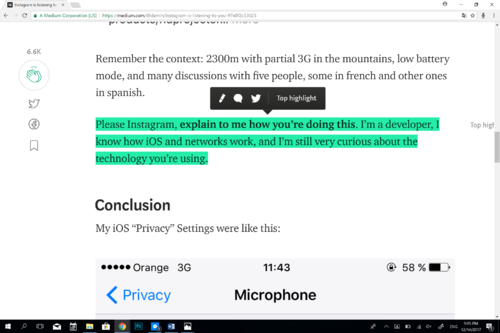
Zoe Kleinmann, Is your smartphone listening to you?
[9]
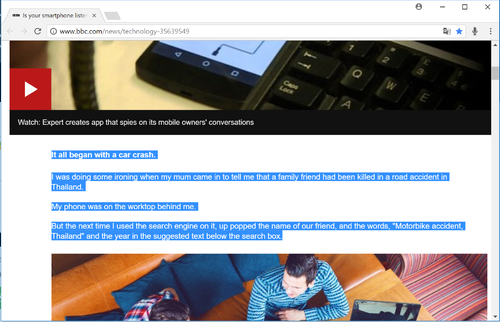
Andy Cheema, We don’t trust the internet. And it’s putting our digital future at risk
[10]
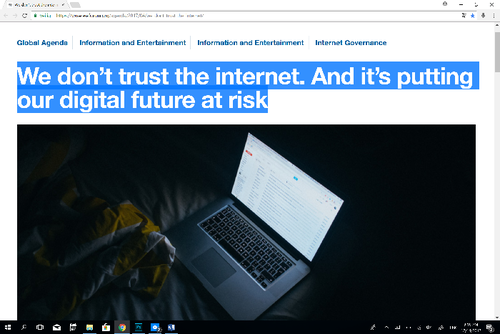
Amnesty, Wordt Vervolgd, Afluisterbarbies en knuffels met camaras; privacy speelt overal
[11]
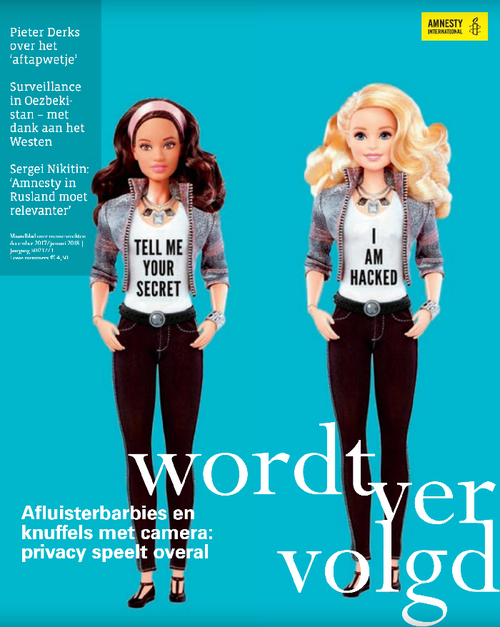
Emma Hinghlife, Why everyone is so convinced Facebook is spying on their conversations
[12]
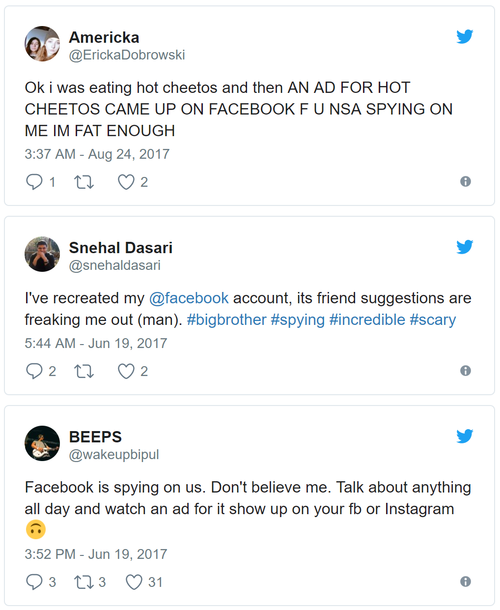
Cultural tribalism
In the world around us numerous cultures and sub-cultures have formed. These cultures could be seen as tribes, held together by shared languages, looks, ancestry and preferences. Within the tribe people are ment to follow one tribe-leader and aren’t supposed to move to other tribes. Loyalty to the tribe is essential to the tribe members. [13]
Data as currency
Bibliography
- ↑ Eli Pariser, The Filter Bubble: What the Internet is Hiding From You, website
- ↑ ,Karin Peusens ,HÉT NIEUWS BESTAAT NIET MEER VOOR JONGEREN, website
- ↑ Gabriella Adèr, Schouderklopjes en high fives, website
- ↑ Damon Darlin, A Question About Friends Reveals a Lot About Class Divides, website
- ↑ Jesse Beentjes, Politieke chatroulette Waaromkiesjij.nl: 'De bubbels doorbreken', website
- ↑ 6.0 6.1 Lynn Berger, Het woord bubbel doorgeprikt, website
- ↑ Echo Chamber (media) [website
- ↑ Damián Le Nouaille, Instagram is listening to you blogpost
- ↑ Zoe Kleinmann, Is your smartphone listening to you? article
- ↑ Andy Cheema, We don’t trust the internet. And it’s putting our digital future at risk article
- ↑ Amnesty, Wordt Vervolgd, Afluisterbarbies en knuffels met camaras; privacy speelt overal magazine
- ↑ Emma Hinghlife, Why everyone is so convinced Facebook is spying on their conversations article
- ↑ Oxford dictionaries, website